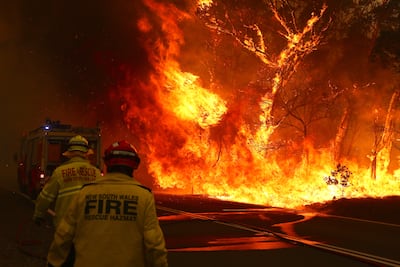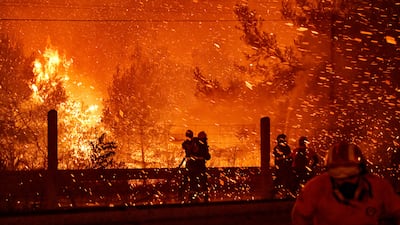Forest fires are becoming increasingly more common outside the tropics, raising concerns about the future ability of trees to absorb carbon dioxide under climate change, a study has warned.
Carbon emissions from forest fires have surged globally by 60 per cent between 2001 and 2023, and almost tripled in some of the most vulnerable northern boreal forests, which cover areas including Siberia, Scandinavia, Canada and Alaska.
The blazes, which are being fuelled by global warming, have resulted in the release of an additional half a billion tonnes of carbon a year.
Forests are major carbon sinks, which means they absorb more carbon dioxide than they release, offsetting the impact of global warming. When they burn, the carbon stored in them is released, turning them into a carbon dioxide source.
Carbon is drawn back out again when the vegetation regrows. But more widespread and severe forest fires are a sign that emissions are now out of balance with the carbon captured by post-fire recovery, say researchers.
Wildfires in Canada – in pictures
“Increases in both the extent and severity of forest fires have led to a dramatic rise in the amount of carbon emitted by forest fires globally,” said Lead author Dr Matthew Jones, of the Tyndall Centre for Climate Change Research at the University of East Anglia, which led the research.
“Startling shifts in the global geography of fires are also under way, and they are primarily explained by the growing impacts of climate change in the world’s boreal forests.
“To protect critical forest ecosystems from the accelerating threat of wildfires, we must keep global warming at bay and this underscores why it is so vital to make rapid progress towards net zero emissions.”
The study found the fires are also becoming more severe, with the carbon combustion rate, a measure of carbon dioxide per unit of area burnt, rising by almost 50 per cent across forests globally between 2001 and 2023. The long-term effect depends on how forests recover, say researchers.
The researchers warned further expansion of forest fires can only be averted if the primary causes of climate change, such as fossil fuel emissions, are tackled.
“The steep trend towards greater extratropical forest fire emissions is a warning of the growing vulnerability of forests and it poses a significant challenge for global targets to tackle climate change,” said Dr Jones.
“We know that forests rebound poorly after the most severe fires, so there is huge interest in how the observed increases in fire severity will influence carbon storage in forests over the coming decades. This demands our close attention.”
The rise in carbon dioxide emissions from forest fires contrasts with the reduced burning of the world’s tropical savannahs during the same period.
“Until now, reduced burning in the already fire-prone savannahs and grasslands has masked increases in forest fire extent and severity that are hugely consequential for society and the environment,” said Dr Jones.
“Our work shows that fires are increasingly happening where we don’t want them to – in forests, where they present the greatest threat to people and to vital carbon stores.”
Last month it was revealed that Brazil’s Amazon and Pantanal wetland regions have experienced their worst wildfires in almost two decades. About 2.4 million hectares of forests, fields and pastures in the Amazon burnt between June and August.
MOTHER%20OF%20STRANGERS
%3Cp%3EAuthor%3A%20Suad%20Amiry%3Cbr%3EPublisher%3A%20Pantheon%3C%2Fp%3E%0A%3Cp%3EPages%3A%20304%3Cbr%3EAvailable%3A%20Now%3C%2Fp%3E%0A
India squads
Test squad against Afghanistan: Rahane (c), Dhawan, Vijay, Rahul, Pujara, Karun, Saha, Ashwin, Jadeja, Kuldeep, Umesh, Shami, Pandya, Ishant, Thakur.
T20 squad against Ireland and England: Kohli (c), Dhawan, Rohit, Rahul, Raina, Pandey, Dhoni, Karthik, Chahal, Kuldeep, Sundar, Bhuvneshwar, Bumrah, Pandya, Kaul, Umesh.
ODI squad against England: Kohli (c), Dhawan, Rohit, Rahul, Shreyas, Rayudu, Dhoni, Karthik, Chahal, Kuldeep, Sundar, Bhuvneshwar, Bumrah, Pandya, Kaul, Umesh
Match info
Champions League quarter-final, first leg
Liverpool v Porto, Tuesday, 11pm (UAE)
Matches can be watched on BeIN Sports
BRAZIL SQUAD
Alisson (Liverpool), Daniel Fuzato (Roma), Ederson (Man City); Alex Sandro (Juventus), Danilo (Juventus), Eder Militao (Real Madrid), Emerson (Real Betis), Felipe (Atletico Madrid), Marquinhos (PSG), Renan Lodi (Atletico Madrid), Thiago Silva (PSG); Arthur (Barcelona), Casemiro (Real Madrid), Douglas Luiz (Aston Villa), Fabinho (Liverpool), Lucas Paqueta (AC Milan), Philippe Coutinho (Bayern Munich); David Neres (Ajax), Gabriel Jesus (Man City), Richarlison (Everton), Roberto Firmino (Liverpool), Rodrygo (Real Madrid), Willian (Chelsea).
The specs
Engine: 6.2-litre V8
Transmission: seven-speed auto
Power: 420 bhp
Torque: 624Nm
Price: from Dh293,200
On sale: now
FROM%20THE%20ASHES
%3Cp%3EDirector%3A%20Khalid%20Fahad%3C%2Fp%3E%0A%3Cp%3EStarring%3A%20Shaima%20Al%20Tayeb%2C%20Wafa%20Muhamad%2C%20Hamss%20Bandar%3C%2Fp%3E%0A%3Cp%3ERating%3A%203%2F5%3C%2Fp%3E%0A
The specs: Fenyr SuperSport
Price, base: Dh5.1 million
Engine: 3.8-litre twin-turbo flat-six
Transmission: Seven-speed automatic
Power: 800hp @ 7,100pm
Torque: 980Nm @ 4,000rpm
Fuel economy, combined: 13.5L / 100km
Coming 2 America
Directed by: Craig Brewer
Starring: Eddie Murphy, Arsenio Hall, Jermaine Fowler, Leslie Jones
3/5 stars
Results
5pm: Maiden (PA) Dh80,000 (Turf) 1,600m; Winner: Rawat Al Reef, Adrie de Vries (jockey), Abdallah Al Hammadi (trainer)
5.30pm: Wathba Stallions Cup Handicap (PA) Dh70,000 (T) 1,400m; Winner: Noof KB, Richard Mullen, Ernst Oertel
6pm: Handicap (PA) Dh80,000 (T) 1,200m; Winner: AF Seven Skies, Bernardo Pinheiro, Qaiss Aboud
6.30pm: Handicap (PA) Dh80,000 (T) 2,200m; Winner: Jabalini, Szczepan Mazur, Ibrahim Al Hadhrami
7pm: UAE Arabian Derby – Prestige (PA) Dh150,000 (T) 2,200m; Winner: Dergham Athbah, Richard Mullen, Mohamed Daggash
7.30pm: Emirates Championship – Group 1 (PA) Dh1,000,000 (T) 2,200m; Winner: Somoud, Richard Mullen, Jean de Roualle
8pm: Abu Dhabi Championship – Group 3 (TB) Dh380,000 (T) 2,200m; Winner: Irish Freedom, Antonio Fresu, Satish Seemar
Where to apply
Applicants should send their completed applications - CV, covering letter, sample(s) of your work, letter of recommendation - to Nick March, Assistant Editor in Chief at The National and UAE programme administrator for the Rosalynn Carter Fellowships for Mental Health Journalism, by 5pm on April 30, 2020.
Please send applications to nmarch@thenational.ae and please mark the subject line as “Rosalynn Carter Fellowship for Mental Health Journalism (UAE programme application)”.
The local advisory board will consider all applications and will interview a short list of candidates in Abu Dhabi in June 2020. Successful candidates will be informed before July 30, 2020.


















